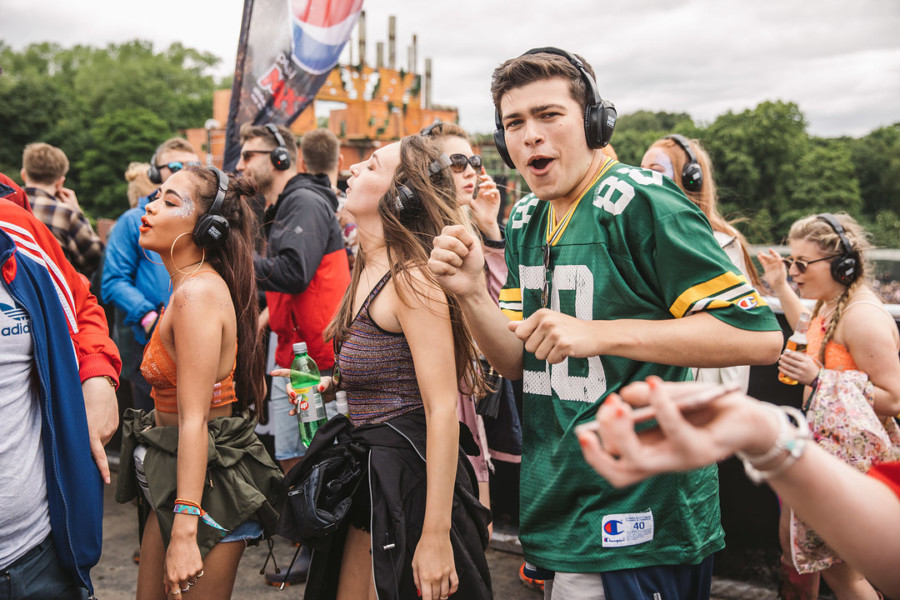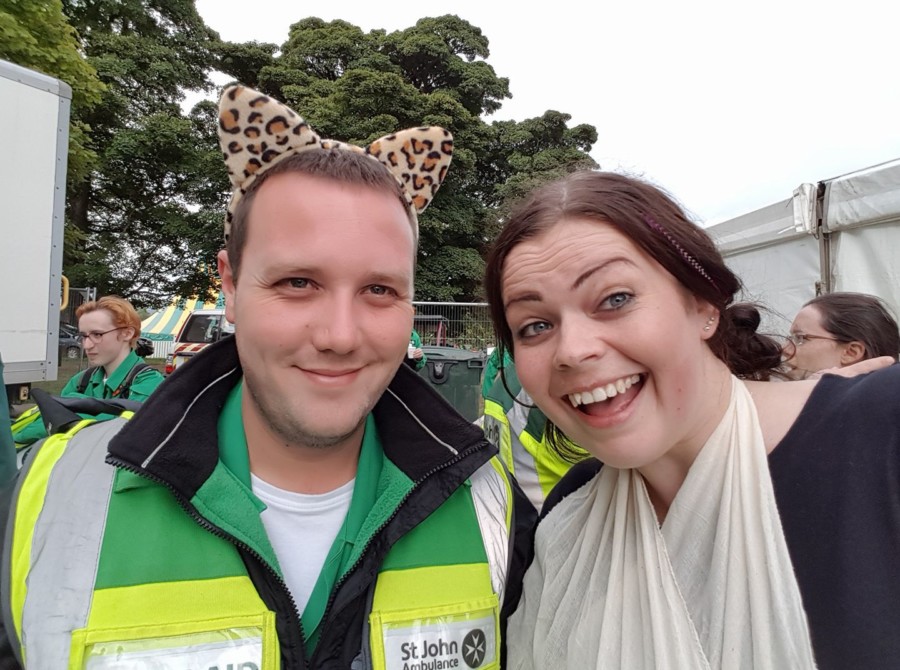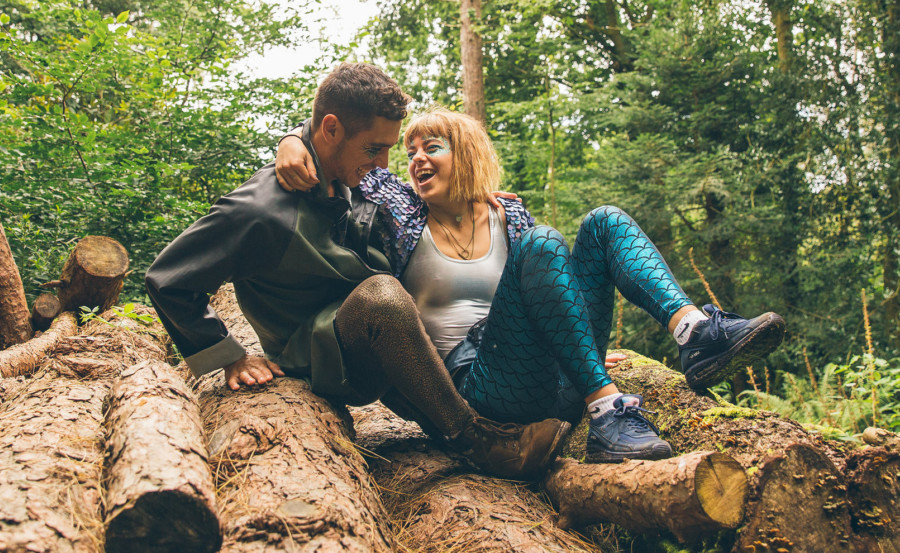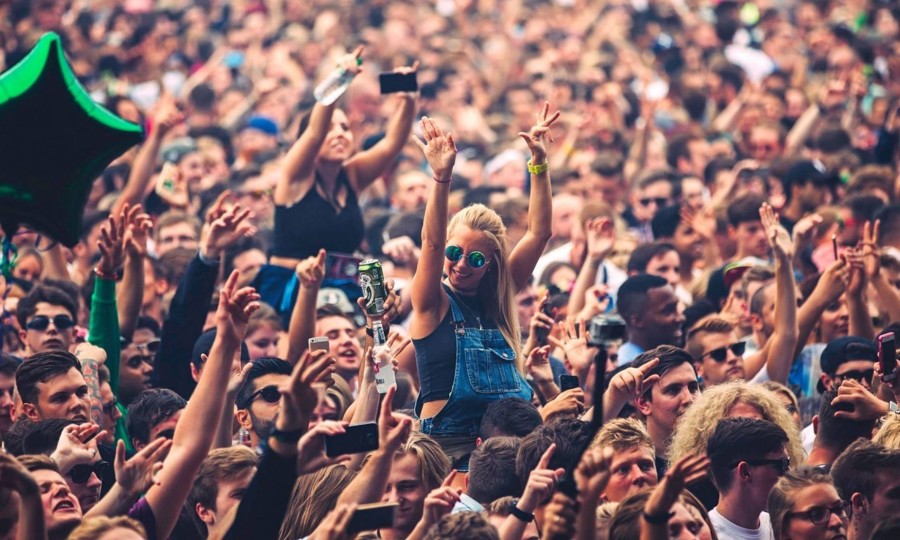Whether it’s chucking it down or blazing sunshine, being outside, walking miles, camping and dancing will test anyone’s endurance skills. Make sure you look after your physical and mental health to stay on top form.
Festival Wellbeing Guide
- Be drink and drug aware – don’t overdo it. Make informed decisions and read our harm reduction advice on alcohol and other drugs.
- Look after your friends – make sure that everyone gets home safely at night and people are not left to walk back to camp on their own. Read more about Safer Spaces here.
- Be a friendly face in the crowd – if you see someone you don’t know who looks like they are struggling or needs some help ask if they are ok. If you see someone alone and unconscious alert a steward or member of event staff.
- Pace yourself and know when to go to bed – have a good time, stay up all night if you are having fun, but there comes a point where you need to ask yourself: Is this fun anymore or do I need a bit of sleep?
- Avoid an upset stomach – you might be happy to dodge the shower for the weekend, but make sure you always wash your hands or use an antibacterial hand sanitiser before you eat and after you’ve used the toilet. If you’re making your own food back at camp, ensure meat is thoroughly cooked. Food poisoning + festival toilets = #FestivalFail.

- Eat regularly and stay hydrated – drinking alcohol, walking for miles, sitting in the sun and dancing can quickly cause you to get dehydrated. Be careful about over hydrating if you are taking ecstasy/MDMA as this can cause problems.
- Love music? Love your ears! – exposure to loud music at festivals and concerts can cause serious long term damage to your hearing. If you do like to be right in the action, wear ear protection. Small children have especially sensitive ears and should always wear ear protection when around loud noise. Ear plugs are not suitable for very young children, full ear muffs should be used.
- Protect yourself from the elements – start by bringing the right gear with you. Wear sun cream to protect yourself, even if it’s cloudy. Always bring a pair of boots or wellies; white trainers + mud = bad times. Once you get cold and wet it can be very hard to warm back up, especially when you are sleeping in a tent so wear a waterproof and stay warm.
- Stay safe in the mosh pit - the mosh pit at a festival can look like total chaos. It might look like anything goes, but there are rules you should follow if you're jumping in!
- Festival welfare is your friend! Check on your event website to see if they have a welfare team and where they are located.

Mosh Pit Rules
- Don’t jump straight in. Observe and see how people are moving before you get involved.
- Look out for each other. If someone falls over, help them get up. You are there to have fun together.
- If someone looks distressed near you try to help make a path for them get out.
- Never try and intentionally hurt someone. If you get hit by accident or intentionally do not retaliate.
- Keep your arms close to your chest.
- Stay hydrated but don’t take drinks into the mosh pit.
- Always listen to security, event staff and artists if announcements are made or you are asked to move back for example.
- Treat everyone with respect and stay safe!

Festival Medics
All festivals have medical teams to look after you. Most problems can be dealt with on site and very few people have to be taken to hospital for treatment. If you need medical attention, make your way, if you can, to one of the medical tents. Medics are much better able to treat you in their own area where they have equipment and supplies so avoid calling medics out if you are able to go on foot.
In an emergency, approach a festival steward/security/member of event staff or police officer who will be able to call the medics for help. Only dial 999 from a mobile phone as an absolute last resort – this may not be the most effective way of getting help on a festival site. It’s best not to try and make your way off site to hospital. This could result in very long and possibly dangerous delays in getting treatment.
NHS 111 – If you require non-urgent health advice you can call 111 from any phone to speak to the NHS helpline.

Top 10 Festival Medical Complaints
- Sprained ankles: walking on uneven surfaces in dark and often muddy conditions leads to lots of soft tissue injuries (and sometimes even fractures). Good sturdy footwear is a must if you want to avoid leaving the festival early on crutches.
- Sunstroke, sunburn and general exposure: stay hydrated, wear a hat, cover up if it’s sunny and slap on a high SPF cream. When night falls, it can get cold quickly so the risk of hypothermia is very real if you don’t stay warm and dry.
- Overdoing it from alcohol and other drugs: the ultimate #FestivalFail! Start low and go slow. It is best to avoid other drugs. Read about how to reduce harm from alcohol and other drugs here.
- Minor wounds (often from falling over): sturdy shoes are a must to avoid trips, slips and falls. Stick to designated paths and don’t be tempted to climb over or crawl under fences. If you do hurt yourself and end up with a wound, make sure you clean it properly and then cover with a sterile dressing to avoid infections.
- Blisters: wear socks with shoes or wellies. Bring plenty of plasters (maybe even plaster up weak points like heels before a day stomping around in the fields). Try to ‘break in’ new footwear before you go to the festival and beware the calf rub from wellies – wear long socks!
- Hyperventilation: this is when someone breathes in excess of what the body needs. It can happen as a result of taking alcohol or other drugs, or if someone becomes panicked and overwhelmed. Try to remove yourself from any environments which may trigger this feeling; take a friend and find somewhere quiet to chill out. Keep calm and if needed walk to the festival welfare services where they will have a safe quiet area to sit and relax.
- Fainting: don’t underestimate the energy it takes to party all weekend. You need to be eating regularly, staying hydrated and getting enough sleep to avoid exhaustion and the risk of fainting. Remember: eat, sleep, rave, repeat.
- Bites and stings: minimise the risk of getting bitten by wearing insect repellent. It’s also a good idea to bring along some antihistamine in case you do get nipped. Keep your camp tidy to avoid wasps hanging around the empty beer cans!
- Upset stomach: a dicky tummy is horrible at the best of times, but when you’re sharing portlaloos with 30,000 other people it really is the pits. Pay attention to hand hygiene and make sure food is thoroughly cooked to avoid this one.
- Burns: take care when changing gas canisters on camping stoves. Never change the gas cylinder when a stove is still hot, wait until it has fully cooled. Only change gas cylinders when they are completely empty and store them away tents. Read more about camping and fire safety.

Sexual Health
When it comes to sex at festivals, hoping for the best isn’t good enough if you want to avoid coming home with an unwelcome souvenir – an STI or unplanned pregnancy.
Being drunk or high can alter your perception and lower your inhibitions which may mean that you decide to do things you normally wouldn’t. You might not be planning on hooking up with anyone, but if romance blossoms in the fields then you want to be ready. Be prepared and always use contraception.
Understanding Consent
Consent means agreeing to do something. When it comes to sex, this means someone agreeing to take part in a sexual activity. Consent isn’t just about a verbal ‘yes or no’, it is a whole-body experience. It involves being in tune with your partner and paying attention to their physical and emotional cues.
Consent should be enthusiastic! Yes means yes, but what you are aiming for is YES YES YES! If someone goes quiet, check in with them.
Consent should always be mutual and continuous. You should never feel pressured into doing something you don’t want to and have the right to say no or change your mind at any time.
Read more about consent and sexual assault in our crime section.
Sexually Transmitted Infections
If you have unprotected sexual contact with someone, then there’s a chance you could catch a sexually transmitted infection (STI). Anyone can get an STI – it doesn’t matter how many times you’ve had sex or how many people you’ve had sex with.
You may or may not have symptoms, so that is not a reliable way of knowing if you have an STI or not. If you have had unprotected sex at a festival, make sure you visit your local sexual health service for a check-up as soon as possible.

The Pill
- Make sure you stock up on your pill before you go to a festival so that you don’t run out. It’s also good to take extra as mistakes can happen and many people forget to use contraception correctly when out of routine.
- Forgetting to take your pill is a common reason for the pill failing. For the pill to work effectively at preventing unwanted pregnancy, you need to remember to take it as directed.
- Set a reminder on your phone (but remember to keep it charged!) so you don’t forget to take your pill. Alternatively you can try to use something that you do every day as a reminder for example brushing your teeth - choose something that you will definitely be doing at the festival.
- The pill does not prevent STIs so to be sure you should always use a condom.
Condoms
Condoms are the only type of contraception that help to prevent STIs. You can get condoms for free before you go to a festival from GPs and sexual health clinics. On site at events you can usually get condoms from the welfare team or general store.
Most people think they know how to use condoms, but it's easy to make simple mistakes (especially in a dark, cramped tent!). It's estimated that three-quarters of us will make a mistake when using them. Find out how to use a condom properly here.
Emergency Contraception
If you’ve had sex without using contraception at a festival, or you think your contraception might have failed, don’t panic! If you act fast you can usually prevent pregnancy by using emergency contraception.
If you feel you need emergency contraception whilst at a festival you should visit the welfare team or medics. If you are leaving, you can get the emergency contraceptive pill, for free from a range of services, including Brook, young people's services, contraception and sexual health clinics, your GP, minor injury units, walk-in clinics and some pharmacies.
Although often called the 'morning after pill' you can actually take it 3-5 days after unprotected sex so if you haven’t managed to get it whilst at festival you may still have time when you get home.
Remember, emergency contraception does not protect against STIs. Some STIs can have no symptoms so it is important to get tested if you think you might be at risk.

Mental Health
Looking after our mental health and wellbeing at festivals is so important as it helps determine how we handle stress, relate to others, and make choices.
Everyone has mental health, it includes our emotional, psychological, and social well-being. It affects how we think, feel, and act. Every year one in four of us will experience a mental health problem.
Festivals should feel like happy, safe and exciting spaces but they can also sometimes be overwhelming. Getting enough sleep, eating regularly and pacing yourself are key if you want to stay on top form.
If you have an existing mental health condition:
- bring any medication you are on with you and remember to take it as prescribed;
- if it’s your first time, read about what to expect at a festival here;
- before you go, think about whether certain situations could be difficult for you, for example big crowds, and try to mentally prepare yourself for what it might be like and what you would do if you become overwhelmed;
- people often forget to eat at festivals. If you have an eating problem think about whether you would prefer to bring your own food or whether you will feel ok buying from the vendors on site;
- if you have a history of poor mental health, you may be more likely to experience negative effects with alcohol and other drugs. Find out more here;
- if you are on medication for a mental health condition be mindful of how this could interact with alcohol and other drugs;
- try to be open with your friends and let them know if you are struggling or need help.
Useful Links
Questions?
All festivals have slightly different rules. If you have any questions you should contact the organisers of the event that you are going to. Visit the event website for details of how to get in touch.
Festival Safe is aimed at people heading to UK festivals. Much of the information you'll find here will be useful wherever your event is being held, but if you are heading to an overseas event remember that rules, and in particular the law, can be different in other countries.

